Photos and travel writing from Yogyakarta, Indonesia (also known as Jogja, or Jogjakarta), meeting students and visiting Indonesia’s cultural city. Or see the photo series of Jogja Becaks (pedicabs). Next: videos, photos and more stories from Jogja, as well as travel tips to visit Yogyakarta.

After evading the unpredictable grasp of death, herein embodied by the slight hands of a seventeen-year old bus driver busy swiveling in his chair while even busier swerving through the thick jungle of Indonesian traffic, the minibus and its tetanized detainees finally drives into the cultural hub of Yogyakarta after 10pm, and after just as many hours of near-continuous driving, mad with fatigue.
…any couple must produce a marriage certificate in order to occupy the same room.
After another hour of searching through dark yet welcoming streets, we discover a friendly hostel, a bit removed from the city center. It’s late and we’re grateful to the clerk for expediting our check-in. We’re a bit more surprised and amused to discover, once in the room, that the official policy states that any couple must produce a marriage certificate in order to occupy the same room.
I suppose this rule doesn’t apply to foreigners, or perhaps that it’s there as a matter of protocol rather than enforcement, much in the way of the hanged and kempt portraits of dictators that garner the bare walls of households in totalitarian regimes.
…old ladies hacking at coconuts with machetes, haggling over a pound of exotic fruit
In the morning, stroll around the neighborhood, open market, old ladies hacking at coconuts with machetes, haggling over a pound of exotic fruit and vegetable. There’s a lot of ‘local flavor’ and I enjoy pacing through the neighborhood, scrutinizing the street art and faces of workers, the women in veil accompanying their husbands, the becak cycling to and fro, heaving their payload – thus benefiting from the one quasi-systematic advantage of electing residence slightly away from a town’s touristic center.

I notice, perhaps even more so in Jogja, that many Indonesians have been happy to pose, or at least stare, soon as they see the camera – to the point where I’m tempted to ask them, in some cases, to resume a ‘natural’ pose, worried to capture the same exact look in every shot and portrait.


(This camera awareness is further exacerbated by the fact that I work with a wide angle 35mm lens – this means being close to the subject –, but I won’t burden you here with these unnecessary technical details, though I hope to eventually write more about my photographic approach, and its evolution over the years and during ooAsia, which should hopefully be of interest to those readers with similar photosensitive inclination.)
A decent-sized rat runs out of sight, fortunately this encounter comes closer to the end of our meal.
At lunch we enjoy the array of dishes offered at a local joint, surrounded by Muslims returning from their prayer, who eye us amicably, more out of curiosity than mischief. A decent-sized rat runs out of sight, fortunately this encounter comes closer to the end of our meal.
As we’re planning on staying a few nights (we need them after the quick pace and long distances travelled ever since Bali), and since our accommodation is unfortunately booked thereafter, we save a few dollars by migrating to a nearby local hotel.
Small streets lined with white walls and bent trees, graffiti, a man sleeping on the side of the road, wood sheds shelved with stands of vodka bottles filled with green-ish fuel (gasoline).

…the morning prayer sifts through the open courtyard and into our room with the loud, magical clarity of an Arabian night.
The room’s drab appearance being offset by a peaceful courtyard (through which we walk to the common showers), we thus settle down. Only at 4am the next morning do we find out about another, rather less mild, inconvenience: we’re located only a block away from the local mosque, and the morning prayer sifts through the open courtyard and into our room with the loud, magical clarity of an Arabian night.
The next day, after being similarly awoken by the guttural, lingering chant, I walk sleepily to witness the prayers – but I will leave this encounter for the next installment.

Our stay in Jogjakarta is otherwise mostly banal:
Hopping in the local bus, which barely slows down at the stop (a word thus devoid of literal meaning), is a sport in itself. Let alone for the kids and ageing folk, but they have the knowhow conferred by experience.

The April heat, blistering, forces us indoors in the early afternoon. More than once, we seek refuge in whatever air-conditioned fast-food franchise we can find.
We walk a lot, and see from afar the Kraton Ngayogyakarta Hadiningrat (Sultan’s palace), or watch the local youngsters trample through Malioboro’s malls and stacks of jeans, picking out the latest heels and apparel.

…their shops bare and black, floors littered with the hardened dust of work…
We enjoy the safe, carefree atmosphere of the university town and its prestigious green lampposts reminiscent of nineteenth-century Paris (or even inspired by?), but also walking through unknown neighborhoods, across the river – and learning from a billboard Miss Universe was then Indonesian – past the industrious artisans of the city, welders and glass-makers, their shops bare and black, floors littered with the hardened dust of work…

Back to Malioboro again, street artists painting canvas straight on the sidewalk, a hip and capped teenage girl testing out her new DSLR on her friends, a rollerblading competition, and a circle of singing guitars, to the claps of the crowd…



…part of us feels bad at the thought of abusing an old man’s fledging legs.
There’s a concert and we stick around, hundreds of motorcycles parked evenly on the grass, the rain falls heavy, the first signs of the approaching monsoon season, for once we hire a pedicab back to the hotel. We’ve been walking otherwise, both to see more of the city, to save some costs, but also perhaps because part of us feels bad at the thought of abusing an old man’s fledging legs.

…but to him it is of his livelihood that our guilt thus robs him
Ah, but to him it is of his livelihood that our guilt thus robs him, and so back to us to ask ourselves whether our principle, though it may seem sound collectively, from the privileged perspective of contemplating future history, does really to him do good in the present?

We eat mie goreng (local fried rice), again and again. These dinners are interspersed with encounters with plump rats fleeing the kitchen scenes, leaving us increasingly unfazed.
But I almost forget to mention the wonders of Prambanan and Borobudur – two of the world’s most devastatingly beautiful religious sites, feats of ancient architecture, one erected to the Gods of Hinduism, the other depicting the steps to Buddhist Nirvana – and both of which are likely why many people visit Yogyakarta.
My experience of the first being rather mild in taste compared to the latter, but weather has to do with it I’m sure (a tawdry grey afternoon of lukewarm light for Prambanan, compared to the majestic sunrise witnessed at Borobudur).

…past the jean stalls of Malioboro and across the river, past the welders and billboard of Miss Universe, to the train station
Till at last we walk back past all these neighborhoods, lugging backpacks in the sweet evening heat, past the jean stalls of Malioboro and across the river, past the welders and billboard of Miss Universe, to the train station, where we will ride through the night, and that is another story to be told.
View our photo series of the ‘Becaks’ in Yogyakarta, Indonesia. Next: videos, photos and more stories from Jogja, as well as travel tips to visit Yogyakarta.



























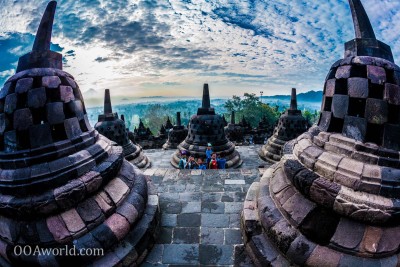
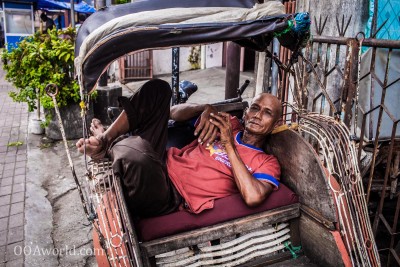
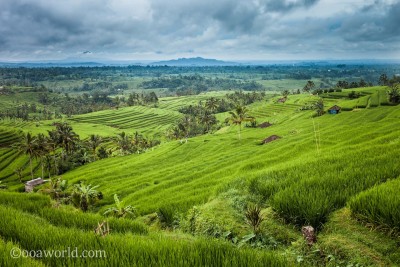
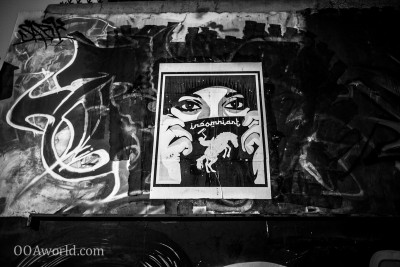
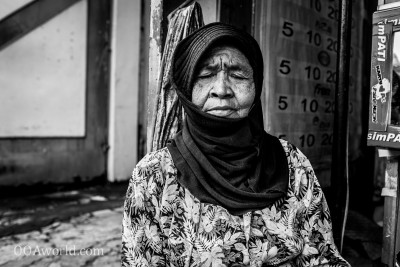
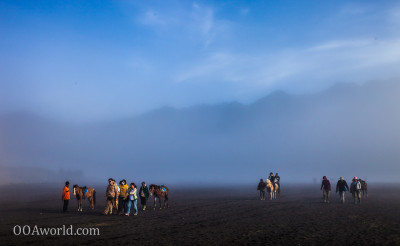
Great!